The lawsuit, filed in Dane County Circuit Court, argues the state constitution allows only convicted felons and the mentally incompetent to be excluded from voting.
The new law creates a third class of people, those who do not have ID, said Andrea Kaminski, Wisconsin League of Women Voters Executive Director. Critics of the law say it would mainly affect minorities and the elderly, who may not have ID.
Not mentioned in the Reuters article is the effect the law is likely to have on student voters, as most WI student IDs have been disallowed for use as voting identification at the polling place, though some of those restrictions are being challenged via the WI Government Accountability Board (G.A.B.), the state's top election authority, which is interpreting the new measure.
Though the WI bill that was jammed through the state legislature by the Republicans who control it and signed by Gov. Scott Walker (R) allows for voters to receive "free" Photo ID at state DMV offices, many of the state's office are infrequently open, and some voters have documented difficulties in obtaining the free IDs even where they were able to take time from work or school and find a way to get to the DMV to go through the tedious process.
In July we reported on the story of a new voter whose residency was challenged after DMV officials rifled through his bank statement to determine whether there had been enough "activity" in the bank account to assure his residency. We also reported in the same story that state officials had explicitly instructed DMV workers to not notify applicants that their ID would be given to them for free, unless they specifically asked for it for the express purpose of voting. Otherwise, a $28 fee would be assessed on top of any costs incurred by the applicant, such as purchasing a copy of their birth certificate or passport or making their way to the DMV.
Kristina Boardman, Director of WisDOT's Bureau of Field Services explained to The BRAD BLOG at the time that the reason they've instructed DMV staffers to not ask applicants if the ID is to be used for voting purposes is because "the statutory language specifically puts the onus on the customer for getting the ID for free for voting."
The frustrating experience of the hopeful voter at the DMV was documented in a video tape recorded during the process which we posted along with our story.
As we also detailed previously, a 2005 study [PDF] by the University of Wisconsin-Milwaukee's Employment and Training Institute found that Democratic-leaning voters such as the elderly, ethnic minorities and college students are likely to be hit much harder by the new law than middle and upper-class white voters...
Minorities and poor populations are the most likely to have drivers license problems. Less than half (47 percent) of Milwaukee County African American adults and 43 percent of Hispanic adults have a valid drivers license compared to 85 percent of white adults in the Balance of State (BOS, i.e., outside Milwaukee County). The situation for young adults ages 18-24 is even worse --- with only 26 percent of African Americans and 34 percent of Hispanics in Milwaukee County with a valid license compared to 71 percent of young white adults in the Balance of State.
...
Only 65 percent of adults in Milwaukee County have a current and valid Wisconsin drivers license, compared to 83 percent of adults in the Balance of State.
...
At UWM, Marquette University, and the University of Wisconsin-Madison, a total of 12,624 students live in residence halls, but only 280 (2 percent) have drivers licenses with these dorms' addresses.
Overall, the AFL-CIO summarized the following details from the same report...
- 23 percent of Wisconsinites over the age of 65.
- 17 percent of white men and women.
- 55 percent of African American males and 49 percent of African American women.
- 46 percent of Hispanic men and 59 percent of Hispanic women.
- 78 percent of African American males age 18-24 and 66 percent of African American women age 18-24.
Today's Reuters report on the non-partisan League of Women Voters' lawsuit adds...
A Milwaukee resident, Adib Khatib Timbuktu, has challenged the law in federal court, saying it violates the equal protection guarantees of the U.S. Constitution.
Jennie Bowser, a senior fellow at the council of state legislatures, said she expects the number of challenges nationwide to grow following the November, 2012 elections.
There are, indeed, likely to be many more such challenges to the law in WI and the dozen or so other states where Republican legislative majorities and governors have jammed through similar voter-suppression measures in advance of the 2012 election cycle.
In addition to Wisconsin, states now attempting to impose strict Photo ID requirements for voters at the polling place (absentee voters face no such restrictions) include Georgia, Indiana, Tennessee, South Carolina, Texas, and Kansas.
Former Nixon Administration counsel John Dean, who tipped us off to the new lawsuit in WI via Twitter, says "more such actions [are] needed."
We concur. As we reported in September, new Photo ID restrictions recently passed in South Carolina and in Texas are currently being questioned by the U.S. Department of Justice. The laws are being examined for pre-clearance by the federal agency to determine if they may have a regressive affect on minority voters, as both states must receive federal approval for new voting laws under Section 5 of the Voting Rights Act of 1965.
Wisconsin is not covered by the same section of the VRA, so a lawsuit brought by a non-governmental organization such as the League of Women Voters may be necessary to block the disenfranchising new law and help to ensure that all legal voters who wish to vote in 2012 are able to do so.
All of that said, when the League of Women Voters signaled their intention to file suit against WI's Photo ID restrictions back in August, The BRAD BLOG's legal analyst Ernest A. Canning noted that even if the group was able to make their Constitutional case, they'd still need to overcome one final, major hurdle: the "Radicals in Robes" who now control the state's Supreme Court.


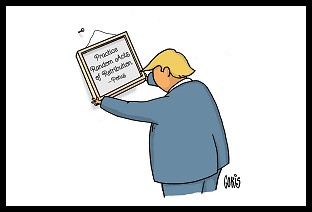 Sunday 'Random Acts of' Toons
Sunday 'Random Acts of' Toons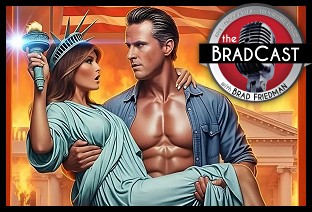 From CA's 'Nuclear Deterrence' Map to Newsom's Trolling to Trump's 'Fascist Theatre' and Beyond: 'BradCast' 8/21/25
From CA's 'Nuclear Deterrence' Map to Newsom's Trolling to Trump's 'Fascist Theatre' and Beyond: 'BradCast' 8/21/25 'Green News Report' 8/21/25
'Green News Report' 8/21/25
 On 'Americanism' and Trump's 'Stalinesque' Plot to Whitewash U.S. History: 'BradCast' 8/20/25
On 'Americanism' and Trump's 'Stalinesque' Plot to Whitewash U.S. History: 'BradCast' 8/20/25 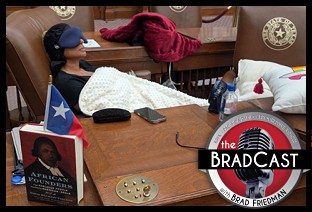 Texas GOP Imprisons Dem State Lawmaker in State House Chamber: 'BradCast' 8/19/25
Texas GOP Imprisons Dem State Lawmaker in State House Chamber: 'BradCast' 8/19/25 'Green News Report' 8/19/25
'Green News Report' 8/19/25 Trump, Nazis and
Trump, Nazis and  Sunday '
Sunday ' Newsom's 'Election Rigging Response Act'; FCC's License Renewal for Sock-Puppeting Sinclair: 'BradCast' 8/14/25
Newsom's 'Election Rigging Response Act'; FCC's License Renewal for Sock-Puppeting Sinclair: 'BradCast' 8/14/25 'Green News Report' 8/14/25
'Green News Report' 8/14/25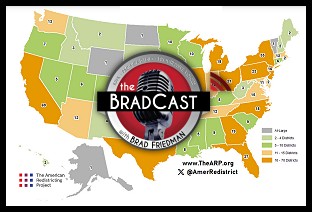 140 New House Reps?: Moving Beyond the Gerrymandering Wars: 'BradCast' 8/13/25
140 New House Reps?: Moving Beyond the Gerrymandering Wars: 'BradCast' 8/13/25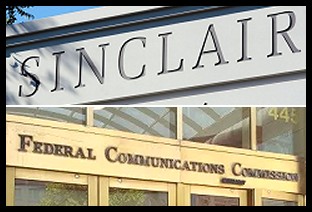 FCC Renews Sinclair TV Licenses Despite Complaint from Petitioner Who Died Waiting
FCC Renews Sinclair TV Licenses Despite Complaint from Petitioner Who Died Waiting It's Not About the Rule of Law, It's About Authoritarian Control: 'BradCast' 8/12/25
It's Not About the Rule of Law, It's About Authoritarian Control: 'BradCast' 8/12/25 'Green News Report' 8/12/25
'Green News Report' 8/12/25 After Vaccine Cancels, CDC Shooting, Former Officials Want RFK Out: 'BradCast' 8/11/25
After Vaccine Cancels, CDC Shooting, Former Officials Want RFK Out: 'BradCast' 8/11/25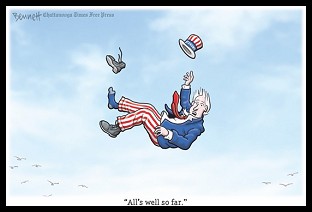 Sunday 'All's Well' Toons
Sunday 'All's Well' Toons 'Green News Report' 8/7/25
'Green News Report' 8/7/25 Trump Wars Against Greem Energy, Democracy on VRA's 60th: 'BradCast' 8/7
Trump Wars Against Greem Energy, Democracy on VRA's 60th: 'BradCast' 8/7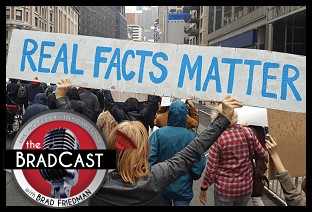 Media Conglomerates Continue Trump Capitulation: 'BradCast' 8/6/25
Media Conglomerates Continue Trump Capitulation: 'BradCast' 8/6/25 Banana Republican: Trump Shoots the Labor Statistics Messenger: 'BradCast' 8/5/25
Banana Republican: Trump Shoots the Labor Statistics Messenger: 'BradCast' 8/5/25 All's Fair in Love, War and, Apparently, Part-isan Gerrymandering: 'BradCast' 8/4/25
All's Fair in Love, War and, Apparently, Part-isan Gerrymandering: 'BradCast' 8/4/25 The Art of the Corrupt, Phony, Unlawful, Pretend Trade Deal: 'BradCast' 7/31/25
The Art of the Corrupt, Phony, Unlawful, Pretend Trade Deal: 'BradCast' 7/31/25 Battle Begins Against Trump EPA Climate Regulations 'Kill Shot': 'BradCast' 7/30/25
Battle Begins Against Trump EPA Climate Regulations 'Kill Shot': 'BradCast' 7/30/25 A Pu Pu Platter of Trump Corruption: 'BradCast' 7/29/25
A Pu Pu Platter of Trump Corruption: 'BradCast' 7/29/25 'Catastrophic' GOP Cuts to Medicaid, Medicare, ACA: 'BradCast' 7/28/25
'Catastrophic' GOP Cuts to Medicaid, Medicare, ACA: 'BradCast' 7/28/25
 VA GOP VOTER REG FRAUDSTER OFF HOOK
VA GOP VOTER REG FRAUDSTER OFF HOOK Criminal GOP Voter Registration Fraud Probe Expanding in VA
Criminal GOP Voter Registration Fraud Probe Expanding in VA DOJ PROBE SOUGHT AFTER VA ARREST
DOJ PROBE SOUGHT AFTER VA ARREST Arrest in VA: GOP Voter Reg Scandal Widens
Arrest in VA: GOP Voter Reg Scandal Widens ALL TOGETHER: ROVE, SPROUL, KOCHS, RNC
ALL TOGETHER: ROVE, SPROUL, KOCHS, RNC LATimes: RNC's 'Fired' Sproul Working for Repubs in 'as Many as 30 States'
LATimes: RNC's 'Fired' Sproul Working for Repubs in 'as Many as 30 States' 'Fired' Sproul Group 'Cloned', Still Working for Republicans in At Least 10 States
'Fired' Sproul Group 'Cloned', Still Working for Republicans in At Least 10 States FINALLY: FOX ON GOP REG FRAUD SCANDAL
FINALLY: FOX ON GOP REG FRAUD SCANDAL COLORADO FOLLOWS FLORIDA WITH GOP CRIMINAL INVESTIGATION
COLORADO FOLLOWS FLORIDA WITH GOP CRIMINAL INVESTIGATION CRIMINAL PROBE LAUNCHED INTO GOP VOTER REGISTRATION FRAUD SCANDAL IN FL
CRIMINAL PROBE LAUNCHED INTO GOP VOTER REGISTRATION FRAUD SCANDAL IN FL Brad Breaks PA Photo ID & GOP Registration Fraud Scandal News on Hartmann TV
Brad Breaks PA Photo ID & GOP Registration Fraud Scandal News on Hartmann TV  CAUGHT ON TAPE: COORDINATED NATIONWIDE GOP VOTER REG SCAM
CAUGHT ON TAPE: COORDINATED NATIONWIDE GOP VOTER REG SCAM CRIMINAL ELECTION FRAUD COMPLAINT FILED AGAINST GOP 'FRAUD' FIRM
CRIMINAL ELECTION FRAUD COMPLAINT FILED AGAINST GOP 'FRAUD' FIRM RICK SCOTT GETS ROLLED IN GOP REGISTRATION FRAUD SCANDAL
RICK SCOTT GETS ROLLED IN GOP REGISTRATION FRAUD SCANDAL VIDEO: Brad Breaks GOP Reg Fraud Scandal on Hartmann TV
VIDEO: Brad Breaks GOP Reg Fraud Scandal on Hartmann TV RNC FIRES NATIONAL VOTER REGISTRATION FIRM FOR FRAUD
RNC FIRES NATIONAL VOTER REGISTRATION FIRM FOR FRAUD EXCLUSIVE: Intvw w/ FL Official Who First Discovered GOP Reg Fraud
EXCLUSIVE: Intvw w/ FL Official Who First Discovered GOP Reg Fraud GOP REGISTRATION FRAUD FOUND IN FL
GOP REGISTRATION FRAUD FOUND IN FL


































